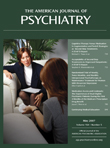Medication Access and Continuity: The Experiences of Dual-Eligible Psychiatric Patients During the First 4 Months of the Medicare Prescription Drug Benefit
Abstract
Objective: This study attempted to systematically assess the experiences of Medicare and Medicaid “dual-eligible” psychiatric patients, including evaluating patients’ access to medications and the administrative functioning of the program, during the first 4 months of the Medicare Part D prescription drug benefit. Method: Psychiatrists (N=5,833) were randomly selected from the American Medical Association’s Physicians Masterfile. After exclusion of those not practicing and with undeliverable addresses, 64% responded; 35% met study eligibility criteria of treating at least one dual-eligible patient during their last typical workweek and reported clinically detailed information on one systematically selected patient. Results: A total of 53.4% had at least one medication access problem to report between Jan. 1 and April 30, 2006. Although 9.7% experienced improved medication access, 22.3% discontinued or temporarily stopped taking medication because of prescription drug coverage or management issues, and 18.3% were previously stable but were required to switch medications. Among those with medication access problems, 27.3% experienced a significant adverse clinical event; 19.8% had an emergency room visit. Most drug plan features studied, including preferred drug/formulary lists, prior authorization, medication dosing/number limits, “fail-first” protocols, and requirements to switch to generics, were associated with significantly higher rates of medication access problems. Conclusions: The findings indicate consequential medication access problems for psychiatric patients during the implementation of Medicare Part D. Although Centers for Medicare and Medicaid Services policies were enacted to ensure access to protected classes of psychopharmacologic medications, the high rates of medication access problems observed indicate further refinement of these policies is needed.



